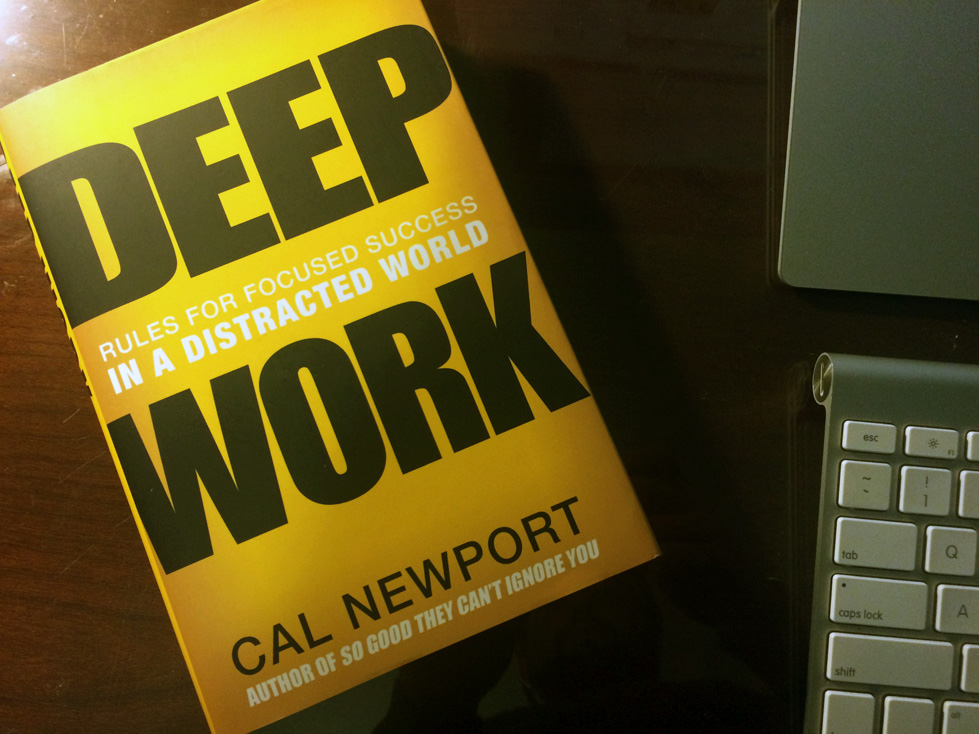In Praise of "Deep Work"
As focused attention becomes rarer and rarer in our distracted culture, the people who cultivate focused attention will find themselves becoming more and more valuable. In other words, you can't afford NOT to be doing deep work. This is the thesis of the book Deep Work: Rules for Focused Success in a Distracted World by Cal Newport, a book that I cannot recommend highly enough. Here's why.
Deep Work: A Definition
Cal Newport, computer science professor at Georgetown University, defines deep work in this way:
Deep Work: professional activities performed in a state of distraction-free concentration that push your cognitive capabilities to their limit. These efforts create new value, improve your skill, and are hard to replicate.
In contrast with deep work is shallow work:
Shallow Work: noncognitively demanding, logistical-style tasks, often performed while distracted. These efforts tend to not create much new value in the world and are easy to replicate.
Most knowledge workers spend most of their time engaged in shallow work--email, anyone--so that, though they may be busy, they are not productive.The people who are writing the best-selling books, making the blockbuster movies, creating the irresistible advertising campaigns, winning the major tournaments, and leading the market-beating companies, these are the people who are doing deep work (whether they realize it or not). Deep work makes a difference.
The Deep Work Hypothesis
The prevalence of shallow work in our culture leads to Newport's deep work hypothesis.
The Deep Work Hypothesis: The ability to perform deep work is becoming increasingly rare at exactly the same time it is becoming increasingly valuable in our economy [and becoming valuable because it is becoming rare--AF]. As a consequence, the few who cultivate this skill, and then make it the core of their working life, will thrive.
Newport also argues that deep work actually makes people happier. As someone who has certainly spent a day being busy without being productive, I know that he's right: I'm happier when I'm able to focus.So, if you want to thrive in our knowledge work economy and if you want to be happier while doing it, you need to learn how to do deep work.
The Deep Work Rules
Newport has come up with what he calls The Rules of Deep Work.
- Work Deeply
- Embrace Boredom
- Quit Social Media
- Drain the Shallows
1. Work Deeply
Deep work is something we can learn how to do. Focused attention is not something you can just turn on or off--it's something that must be trained and cultivated, like a muscle. Just as someone who spends his time sitting on the couch eating Doritos and watching television cannot overnight become a marathon champ, neither can someone who spends his time like that be immediately good at deep work. Deep work requires practice and planning.
2. Embrace Boredom
Internet tools (social media, on-demand video, infotainment sites, etc.) have taught our minds to need constant stimulation, but deep work requires focused attention, and our need for shallow stimulation will undermine our ability to do deep work. Therefore, we need to embrace boredom. It's good to resist the urge to pull out your smart phone when waiting in line at the post office: our minds need boredom.
3. Quit Social Media
You knew this was coming, right? Newport makes the argument that people who are actually producing deep work (best-selling authors like Michael Lewis, e.g.) produce deep work because they do not allow themselves to be distracted by social media. I know lots of people believe that social media is like alcohol--to be used and enjoyed in moderation. I wonder, though, if social media is more like heroin: addictive and distracting for everyone. (UPDATE: In conversation, I could say something provocative like that and you'd understand from my jocular tone what I was trying to convey, but I realize that, if you just read those words, they come across differently. My church actively uses social media (and I use it, too) and I have many friends who work in social media marketing; if I really believed that social media was the same thing as heroin, I'd stop using it immediately. I think social media marketing is necessary in our culture. My point is just that I think all of us are much more easily distracted than we want to admit.)
4. Drain the Shallows
By "drain the shallows," Newport means that we should aggressively eliminate the non-essential from our working lives. For example, he gives practical tips on how to cut down on email, a major source of shallow work for most people.
Why I Need This Book
About 45 times a year, year after year, my professional responsibilities require me to create a brand-new, relevant, engaging, and faithful presentation and then deliver it in front of an average live audience of about 1,000 people, each one of whom is judging me savagely (even if they seem to be nice people!) on that presentation. In addition to that, I also create multiple smaller presentations and essays through the year that also need to be original, relevant, helpful, and faithful. In our distracted world, it seems as if everything but the truly important is screaming LOOK AT ME! PAY ATTENTION TO ME!, and so I've come to the following conclusion:
if I don't learn to do deep work, I'm not going to make it.
Deep Work is one of the most insightful, practical, and challenging books I've read about work and creativity...maybe ever. I cannot recommend this book highly enough.★★★★ excellent
Note on My Rating System
I use a 5 star system in my ratings to signify the following:
★★★★★ life-changing and unforgettable★★★★ excellent★★★ worth reading★★ read other things first★ not recommended
